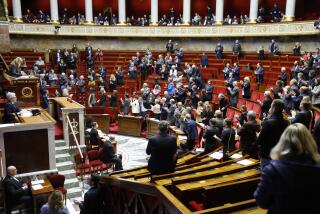In Tainting Liberals, We Ignore Our Heritage
The words liberal and liberalism first appeared in the vocabulary of everyday American political life in the early years of Franklin D. Roosevelt’s presidency, and afterward they stood for the viewpoint of the New Deal. When Lionel Trilling’s “The Liberal Imagination” appeared in 1950, and then Louis Hartz’s “The Liberal Tradition in America” in 1954, they were innovatively relating the doctrines of classical European political and social thought to the special characteristics of American life.
In the current era of Ronald Reagan’s continued immense popularity, none of the leading contenders in American politics have seemed eager to call upon the tradition of liberalism. Yet in 1944 the Nobel Prize-winning Swedish writer Gunnar Myrdal put his finger on the paradox that liberalism in America is traditionalistic; he wrote that “America is conservative . . . but the principles conserved are liberal and some, indeed, are radical.”
It does not take too much historical reflection to turn back to Thomas Jefferson and the early paragraphs of his Declaration of Independence. It is at least as patriotic to think about our dedication to the historical principles of “life, liberty, and the pursuit of happiness” as to recite the far more recently appearing Pledge of Allegiance. But I believe that a political campaign ought to be devoted to concentrating on the public issues that are outstanding, rather than working up nationalistic emotional fervor.
There is no dispute about the greatness of America, but its heritage is broader than that implied by those who have recently been so eager to stigmatize the word liberal as a politically dirty one. American liberalism has its roots in a European past, embracing such heroes of intellectual history as John Milton, John Locke and John Stuart Mill.
It is not necessary to exclude any ideological strains from the broad American moral consensus. Long ago Ralph Waldo Emerson wrote of the liberal and the conservative: “Each is a great half but an impossible whole. Each exposes the abuses of the other but in a true society, in a true man, both must combine.”
This political campaign would rise to a higher level if the use of symbolic behavior (like flag-saluting) were minimized, and the candidates themselves examined. For me, Michael S. Dukakis is that rare political creature who naturally combines progressive principles with conservative inclinations. But the other candidates on the November ballot also deserve scrutiny to the extent to which they embody liberal as well as conservative commitments.
We will never get far in the direction of sophisticated political discussion as long as the one word, liberal, remains tarred and tainted, in spite of its being so intrinsic a part of our nation’s heritage.
More to Read
Get the L.A. Times Politics newsletter
Deeply reported insights into legislation, politics and policy from Sacramento, Washington and beyond. In your inbox three times per week.
You may occasionally receive promotional content from the Los Angeles Times.









